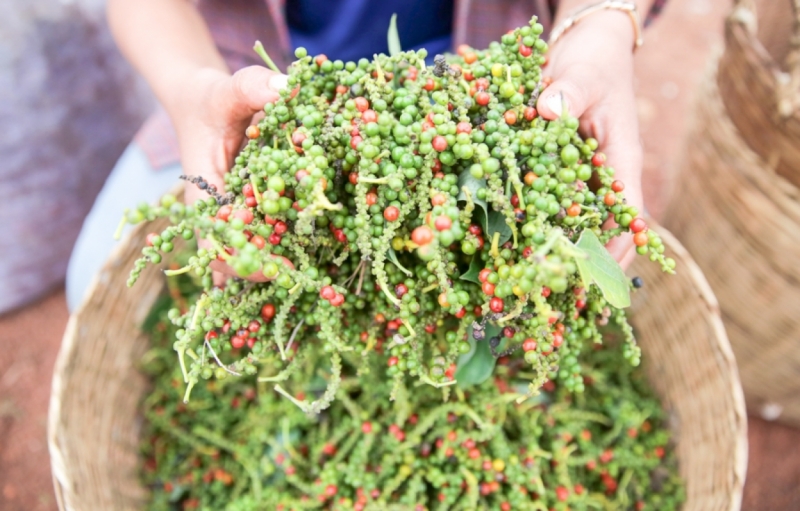



From Khmer Times

This is a typical morning for many villagers in Kampot province’s Kampong Trach district, where almost 400 families are members of Kampot Pepper Promotion Association.
Ms Sina, a farmer in Damnak Kanthout commune, is hopeful the pepper trade will turn around her family’s fortunes. Until recently, she farmed mangoes, but the market was volatile and she was often left out of pocket.
Carefully picking up each stem one by one, Ms Sina explains her decision to move into the pepper business. The stable price of the world’s most traded spice was the biggest draw, plus the fact Kampot pepper is protected by geographical indication (GI) status.
Black Kampot pepper currently sells for $15 per kilogramme, while red fetches $25 and white $28 per kg.
“The price of pepper is stable, so we don’t have to worry about the markets. Pepper planted here is recognised worldwide,” Ms Sina says.
GI status is a type of intellectual property that identifies a product as having originated in a particular country or place, using specific production methods.
Kampot pepper was granted GI status from the EU and Vietnam last year, while Thailand followed with recognition in March.
Since GI status came into force, the Kampot Pepper Promotion Association has been attracting more members with more farming land than ever.
Association president Nguon Lay says GI status has encouraged new farmers and investors to cultivate pepper in Kampot province, because they can guarantee a good price on exports.
“Farmers and investors have faith in the market to ensure good prices every season,” Mr Lay explains. “We have GI certificates from the EU and more recently Vietnam and Thailand, so investors are expanding cultivation land.”
Pen Nay, a farmer with a new 300-pepper tree plantation in the same village, was also attracted to the crop by the promise of earning a fixed income from it.
“I grew mangoes before, but the price of the fruit would go up and down depending on the season,” Ms Nay says. “I heard that pepper commands a stable price that has been increasing, so that encouraged me to switch.”
Ms Nay walks between the pepper vines on her farm, plucking out weeds as she goes. She explains how her next step will be to join the Kampot Pepper Promotion Association, to gain access to the price guarantees that come with exports to foreign markets.
“I am preparing my farm in line with the association’s rules. I hope I will be allowed to join soon,” she says.
The association is currently checking through 50 applications, Mr Lay says.
“We are scrutinising the proposals and inspecting farm land. Some of the farms still have problems that we need them to correct,” he adds.
Last year, about 73 tonnes of Kampot pepper were cultivated, 53 tonnes of which were exported to foreign markets.
Mr Lay expects pepper production to reach 100 tonnes this year.
According to the Ministry of Agriculture, pepper cultivation land covers 6,124 hectares in the country, producing nearly 12,000 tonnes of the spice nationwide.
However, pepper without GI status fetches lower prices and is mostly exported to Vietnam.
Hean Vanhan, director-general of the ministry’s general directorate of agriculture, said the price of non-Kampot pepper has been falling steadily. Officials are now conducting studies on whether other areas could apply for GI status too.
“The rest of Cambodian pepper is suffering from unstable prices, so we are trying to identify the unique tastes and qualities of peppers from other provinces, besides Kampot, to see if they could also get GI listing,” Mr Vanhan says.
Mr Lay is confident Kampot pepper will keep its place in the market no matter what happens with the rest of the country. He believes the price of the spice will only rise, arguing the quality of Kampot pepper is unrivalled.
Ms Sina is similarly hopeful about the outlook for her business, as she packages up red and white pepper to sell via the association. She is planning to expand cultivation, and won’t be returning to mango farming anytime soon.